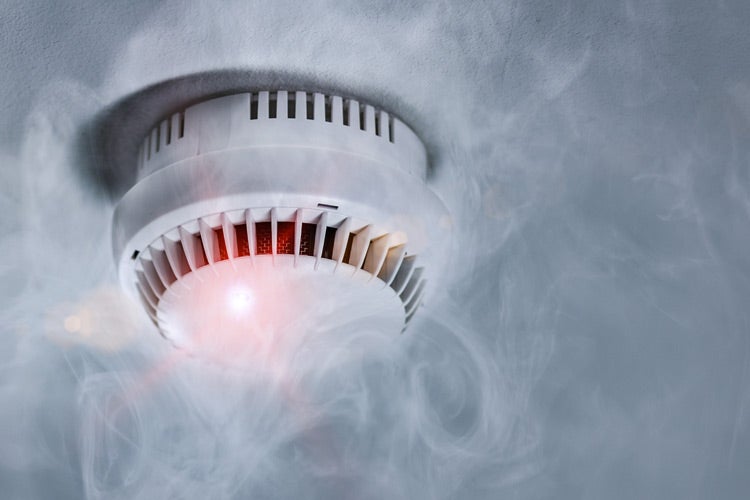
According to the Office of the State Fire Marshall of South Carolina, in 2018 South Carolina fire departments were called to 435,007 incidents. This included 7,592 structure fires resulting in 85 civilian deaths, 210 civilian injuries, and nearly $129,000,000 in property damage.
There are ways that you can prevent fires in your home as well as stop the spread and minimize the damage if a fire starts. And if you do have a fire in your South Carolina home, it’s important to know the role that your homeowners insurance plays in your recovery.
What to Do Now to Prevent House Fires in South Carolina
Having working smoke detectors is one of the most important things you can do right now to protect your family when a house fire starts. According to the South Carolina Department of Health and Environmental Control (SCDHEC), a working smoke alarm can reduce the risk of death in a residential fire by an estimated 40% to 50%.
An estimated 95% of households have smoke alarms, but unfortunately many do not work because the batteries are dead or the actual alarms are not functioning properly. Here are some best practices for smoke alarms from the SCDHEC.
- Install a smoke alarm on each floor of your home and one outside each bedroom.
- Ensure there is at least one alarm on every level of your home, including the basement level if you have one.
- An alarm should be installed in each room where someone sleeps with a door closed, and in every room where a smoker sleeps.
- It’s preferable to place smoke alarms on the ceiling rather than on the wall.
- Ceiling alarms should be in the center of the room if possible, or at least four inches from the sidewall and at least two feet from any corner.
- Wall mounted alarms should be between 4 and 12 inches from the ceiling and at least two feet from any inside corner.
- Avoid placing smoke alarms in garages, high airflow areas near air vents or air returns, within the peaks of A-framed ceilings, or areas of extreme temperatures. These may lead to false activations.
- Avoid placing smoke alarms in dusty areas, humid areas, or near fluorescent lighting. These may lead to false activations.
Smoke alarms must be monitored and maintained to make sure they continue to function. The National Fire Protection Association says that you should:
- Test all smoke alarms at least monthly by pushing the test button. Be sure to save the manufacturer’s instructions for testing and maintenance information.
- Replace batteries in smoke alarms at least once per year. If an alarm chirps, it is a warning that the battery is low. Replace it right away.
- Replace all smoke alarms — including alarms that use a 10-year battery and hard-wired alarms — when they are ten years old, or sooner if they do not respond properly.
- A qualified electrician must install hard-wired alarms.
Remember that special smoke alarms are available for people who are deaf or hard of hearing. These alarms use a strobe light to alert people when smoke is detected.
Can You Prevent a House Fire from Spreading?
When a fire breaks out in your South Carolina home, even if it’s a small fire, the flames can quickly engulf the entire home, damaging your home and all of your belongings. There are a few things you can do to prevent a fire from spreading once it starts.
- The sooner you respond to the fire, the greater chance you have for limiting its spread.
- Consider installing fire doors in your home. They can slow the spread of a fire for a limited period of time.
- Use fire-resistant construction materials such as wood, steel, and concrete to safeguard your property as much as possible.
- Consider buying textiles and furnishing that have been treated with a fire retardant. You can also treat them yourself.
- It’s more difficult for fire to spread if your home is compartmentalized. Closing doors will block the fire’s access and limit the speed of spread.
It’s most important to keep fire extinguishers handy in all levels of your home. At the very least, keep a fire extinguisher in the kitchen and other high-risk areas like the fireplace or near the dryer.
Remember to keep your fire extinguishers away from the potential sources of fire so you can access them safely when you need them. And it’s important that all members of your household know how to properly use a fire extinguisher. Be sure to read the instructions well before it’s time to use it!
How an Agent Can Help Me Protect My South Carolina Home from House Fires
Fortunately, fire is typically one of the “covered perils” included in most standard South Carolina home insurance policies. If you have a fire in your South Carolina home, you can expect your homeowners policy to offer the following types of coverage to help you repair and replace you damaged property:
- Dwelling coverage
- Personal property coverage
- Other structures coverage
- Temporary living expenses coverage
It’s important to review your South Carolina insurance policy every year to make sure you have all the coverage you need. If you’re shopping for homeowners insurance in South Carolina, working with a local independent insurance agent is your best bet. Independent agents aren’t tied down to one insurance company. They can help you shop around for the best coverage at a price that fits your budget.
Article Reviewed by | Paul Martin
https://www.scdhec.gov
http://statefire.llr.sc.gov
https://iii.org
https://nfpa.org
© 2025, Consumer Agent Portal, LLC. All rights reserved.